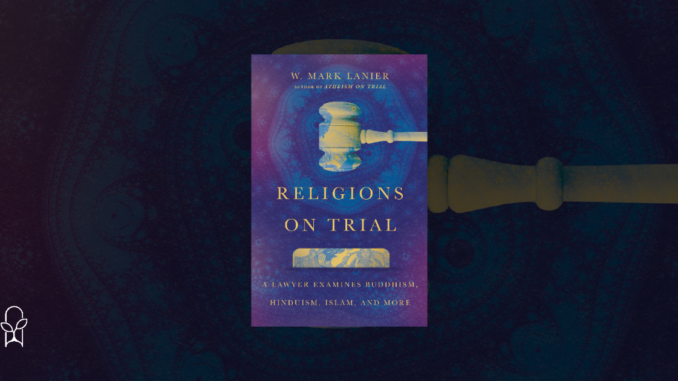
Published by IVP on January 3, 2023
Genres: Non-Fiction, Apologetics
Buy on Amazon
Goodreads

Buddhism and Hinduism, historical religions like Islam and Mormonism, or more nebulous modern expressions of being spiritual but not religious or religious but not spiritual. How do we know what is true? Is one faith just as good as another?
Trial lawyer Mark Lanier presents the claims made by the world's great religions, discusses their histories, and cross-examines their witnesses (their scriptures and traditions) to determine whether their claims are worthy of belief. With his keen legal mind and methodical style, he provides a careful comparative study, highlighting key truths he finds in each religion even as he offers critiques. Treating each perspective on its own terms and weighing the worldviews for consistency and livability, Lanier assesses evidence for and against belief systems with criteria for what constitutes sufficient proof.
Believers and unbelievers alike will find here perceptive insights into how we can make sense of competing religious claims and what difference it makes for our own lives.
Ever since Lee Strobel’s The Case for Christ in the 1990s, a whole subgenre of apologetics has popped up with various professions using their expertise to evaluate Christianity or critique the competition. This is one of the latter, as W. Mark Lanier—trial lawyer extraordinaire—turns his legal prowess toward an exploration of world religions. Lanier, who is both a practicing attorney and a committed Christian, brings his unique perspective to bear on the subject of religion, examining each faith as if it were on trial.
The book begins with a brief overview of the legal process, and how it can be applied to the study of religion. He offers six questions that provide a solid framework for his analysis:
- Is the view objectively consistent with the world?
- Is the view subjectively consistent with who and what I am?
- Is there cross-consistency?
- Is it livable?
- Does it answer the Big Questions?
- Does it make for good people and good societies?
Lanier then moves on to examine a number of major world religions, including Hinduism, Buddhism, Islam, Judaism, and Christianity. For each faith, he presents a detailed case, examining the evidence for and against it, and then rendering a verdict. To be honest, I didn’t find Religion on Trial to be very comprehensive. It divides itself into three parts: 1) mystical faiths, 2) historical religions, and 3) modern religious expressions. The two “mystical faiths” are Hinduism and Buddhism. Does this imply that Christianity is not mystical? Regardless, Lanier’s exploration is pretty superficial and perfunctory, and always in comparison to Christianity.
Historical religions include Judaism, Islam, and Mormonism. The latter seems out of place, as it is more of a cultic offshoot of Christianity, but I understand its inclusion due to the global popularity of Mormonism and that many within evangelicalism stopped talking about Mormonism as a cult right around the time Mitt Romney was the Republican nominee for President. The exploration of Judaism is pretty much just to say “Yes, I agree, but add the Jesus” without much critical evaluation or exploration.
The third part of the book deals with “modern religious expressions,” which Lanier divides into “secular spiritualism” and “secular Christianity.” Again, the problem with this is the terminology. It’s subjective. Lanier can pick and choose what he means and when he controls the definitions, he controls the argument and its efficacy.
As very much an aside about definitions, in an attempt to talk about the importance of precise definitions but mostly to namedrop his famous Jewish friend—Supreme Court Justice Antonin Scalia—Lanier provides an anecdote about Scalia that pretty much tells you everything you need to know about the man’s personality. The two got into an argument over the validity of the word “prequel” and when Scalia found that it had been included in the latest version of Oxford’s English Dictionary, he wrote the editor to petition to have it removed. This has nothing to do with Religion on Trial, but I thought it said a lot about how those in power often try to exert that power for petty purposes.
I will say that while Lanier’s legal background is evident throughout the book, he never loses sight of the fact that religion is ultimately about faith, not proof—almost to the detriment of the book as he places himself as the ruling judge determining the strength of his own arguments. I appreciate that he takes a respectful tone for the religions he critiques, but it’s obvious the case is rigged from the beginning. I agree with a lot of what Lanier says, but I think the way in which he has portrayed it is not entirely honest. When Strobel wrote The Case for Christ as a journalist, he went and interviewed people. He engaged as a journalist. With Religion on Trial, Lanier doesn’t just engage as a lawyer, he’s judge, jury, and executioner. He never engages world religions in ways that allow those religions to speak for themselves. The result is a mediocre apologetic that treads no new ground and no framing it around a schtick, however appealing, can fix that.
